Editor’s Note: The following comprises the fifteenth chapter of Sunshine and Storm in Rhodesia, by Frederick Courteney Selous (published 1896). All spelling in the original.
CHAPTER XV
Leaving Mangwe on 2nd April, I rejoined my men on the following day, and we then escorted the convoy of waggons to Bulawayo, where we arrived early on the morning of Saturday, 4th April.
Before reaching Bulawayo, I had heard that a Greek trader had been murdered in the Bulilima district, near the Maitengwe river, and this news was confirmed by the Rev. Mr. Reed and Assistant Native Commissioner Gordon, both of whom had been stationed in the same district, and both of whom owe their escape to the fact that they received notice from friendly natives that their lives were in danger. Mr. Gordon was informed by his own native police that a Matabele Induna, named Langabi, had given orders to his people to kill him, and they not only warned him of his danger, but escorted him by bypaths through the dangerous part of the country, and put him on to the main road to Bulawayo.
These police, thirty in number, have all remained loyal to the Government. One of them was murdered by the rebels, but the remainder all reported themselves to the Chief Native Commissioner, by whom they were disarmed, but they have since been employed on Government service.
Mr. Reed was saved by the Makalaka amongst whom he was working. They informed him that the Greek trader living near him had been murdered, and told him plainly that he too would be killed unless he got away to a place of safety. At the same time a horse was sent to him by the Rev. Mr. Carnegie from Hope Fountain, together with a letter containing information concerning the generally disturbed state of the country. This decided him to leave his station for the time being and retire on Bulawayo, which place he reached safely the day before the return of my patrol from Mangwe.
During my absence two patrols, somewhat stronger than those first sent out, had been despatched to the Gwanda and Shiloh districts. The first, under Captains Brand and Van Niekerk, had left town on the previous Thursday, in order to relieve a party of prospectors and families said to be in laager in the Gwanda district. This patrol consisted of one hundred mounted men—fifty of C troop and fifty of the Africander Corps—and was accompanied by a mule waggon and a Maxim gun. The second patrol, numbering one hundred and sixty-nine men all told, and accompanied by a Maxim gun, was commanded by the Hon. Maurice Gifford, and had started on the Friday night to dislodge an impi, which it was reported had gathered in the hills near Shiloh. I will first give a short account of the proceedings of the Gwanda patrol, for the most interesting portion of which, namely the account of the return journey to Bulawayo, I am indebted to Lieutenant Webb of the Africander Corps, who has most kindly placed the graphic description which he has himself written of this fateful march at my disposal.
Leaving Bulawayo at six o’clock on Thursday evening, 2nd April, the first halt was made at Spargot’s store, some six miles from town. Here the horses were off-saddled for an hour. During the halt one of the sentries found a wounded Kafir lying in the grass, who, on examination, proved to be the colonial boy “Jim,” who had been so terribly knocked about by the Matabele at Edkins’ store, that when discovered there it was not thought he could possibly survive many hours; and yet, thanks to the food that had been left with him, he had not only been able to keep body and soul together, but had recovered in the course of a few days sufficiently to enable him to make his way slowly and by easy stages, travelling always by night, to Bulawayo. Fortunately he was never short of food, as the rainy season being not yet over, the young maize cobs—green mealies—were standing ready for plucking in all the native fields.
After leaving Spargot’s the next halting-place was Dawson’s store at the Umzingwani river, which was reached late at night. The store it was found had been burnt and destroyed by the Kafirs, but the mule stables were still standing, and in them a plentiful supply of maize was obtained for the horses. The latter were all placed inside the stable fence, whilst the men lay down behind their saddles on the rising ground outside. The pickets were fired on during the night, but a few volleys from a portion of the Africander Corps drove the Kafirs off, though they were afterwards heard calling to one another in the hills near the river.
“When day broke no natives were to be seen, and the horses were at once saddled up, and the march continued. Spiro’s store, thirty-seven miles from Bulawayo, was found to have been totally destroyed by fire, but Grainger’s hotel, twelve miles farther on, was still standing. The Kafirs had, however, apparently only just left it before the patrol arrived, as everything was in the utmost disorder, and water was discovered in a bucket which had evidently only just been brought up from the stream, as some of it had been spilt on the ground. A large supply of maize was again found in the mule stables, so the horses got another good feed.
In the evening the expedition moved on to Grainger’s second store, which it was found had not been interfered with by the natives. Here Friday night was passed, the men again lying down behind their saddles. Early the following morning Dawson’s store at “Amanzi minyama” was reached. It was found to have been very recently deserted by its European occupants, and since their departure had been partially looted by Kafirs. From here a move was made to Mr. Nicholson’s camp, some four miles farther down the road, where it was thought that all the white men in the Gwanda district had probably collected. On arriving there a most excellent fort was discovered on the top of a kopje near the camp. Whilst the fort was being strengthened, Mr. Zeederberg, the well-known post contractor, and three more men rode down the Tuli road to discover how far ahead the Gwanda people were. Mr. Zeederberg and one of these men rode through to Tuli, in order to despatch telegrams to Bulawayo; but the other two returned the following day, after having caught up the waggon with the people from Dawson’s store, who were retiring on Tuli, and who reported that the Gwanda party was thirteen hours ahead of them, making for the same destination. On Sunday, 5th April, two more despatch-riders were sent to Tuli with farther messages for Bulawayo, asking that reinforcements and a Hotchkiss gun should be sent down to meet the patrol on its return, as, from information received from a native scout, it was believed that the Kafirs would attack them in force at some point along the road. On Wednesday morning the despatch-riders returned, with a message informing Captain Brand that it was impossible to send the reinforcements asked for, and requesting him to return as soon as possible to Bulawayo. On Monday, the day after the despatch-riders had left, an escort which had been sent in charge of a waggon to Dawson’s store to bring in some supplies was fired on by the Kafirs. Captain Van Niekerk with some men of the Africander Corps, and some of C troop under Mr. Holland, immediately went off in pursuit, but beyond a few stragglers saw nothing of them. On the following day Captain Van Niekerk and Mr. Purssell went out with a force to patrol round the store and bring in all the remaining stores left. They found the country strewn for several miles with blankets, boots, etc., left by the Kafirs in their hasty flight on the preceding day, but again no resistance was met with.
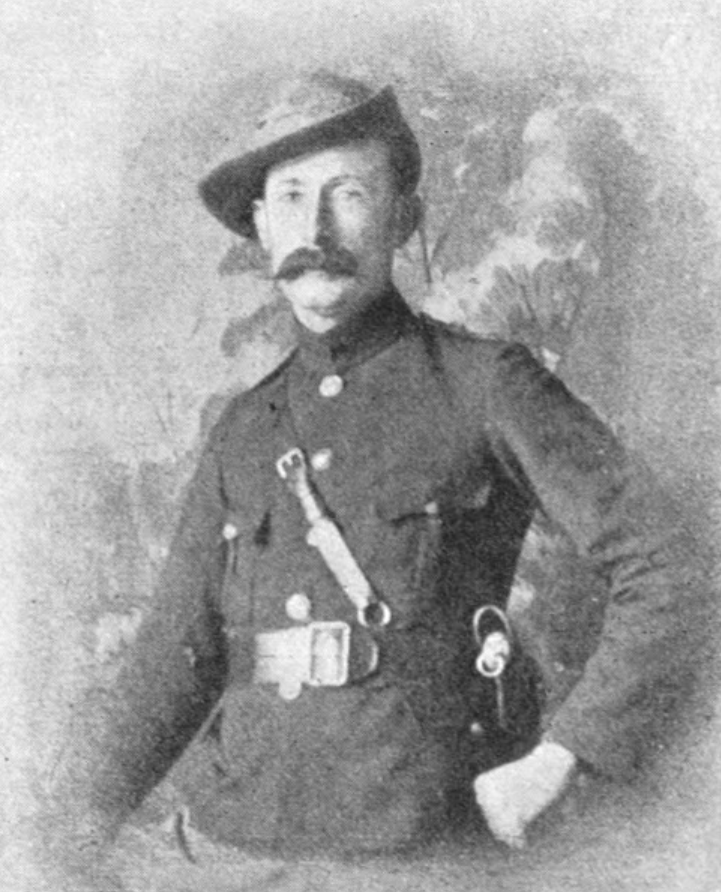
From this point I will proceed with the narrative in Lieutenant Webb’s own words, as follows:—
“We started early the next morning, 9th April, on our return journey. By lunch time we had marched fifteen miles, and reached Grainger’s store No. 2. This place we found had been burnt to the ground by the Matabele during our stay at Gwanda, and judging by the spoor a large number of them had been at work. We decided to stay the rest of the day at this place, and were careful to take every necessary precaution in case of a night attack. Next morning we saddled up at daybreak, and covered twelve miles to Grainger’s store No. 1, before halting. This store had in our absence shared the same fate as the other, and we recovered nothing from the ashes. As we were now entering a most dangerous section of the road, we were careful to use extra vigilance. At about ten o’clock we came up with some cattle at the foot of the range of hills on our left, but before capturing them, narrowly inspected the hills for natives, as we suspected a trap. Sure enough on a ridge about 1000 yards away we made out a body of men hiding under cover. We at once put the Maxim on them, and as they retreated in haste up the side of the hill, we found that several hundreds of them had been waiting in ambush. They only returned our fire with one or two shots. We were then going through thick bush, with hills a couple of hundred yards away towering on each side.
“Upon emerging from these, we came to the ruins of Spiro’s store, and about a mile beyond we saw a column of smoke ascending, and rightly conjectured that this was the place where they meant to attack us. The situation was all in their favour. We had to pass through a narrow neck amongst the hills in order to emerge into comparatively open country, though even this latter afforded them ample cover from our fire. The first evidence we had of the ambuscade was a steady and prolonged fire directed at the head of the column (composed of our corps) from the kopjes on the left flank. We at once returned the fire; but so well was the enemy concealed amongst the rocks, that I may tell you—though you will hardly credit my statement—that I scarcely saw one of them for half an hour. As the column was pressing on to get out of the dangerous position we were in, a few of Captain Brand’s men fired just in front of the faces of the mules drawing the provision waggon. The mules swerved round suddenly, and broke the disselboom. Whilst the damage was being repaired, Mr. Jobson, who was in command of the Maxim, brought his gun into action with the greatest coolness and promptitude; but this unfortunate accident delayed us for half an hour, and was largely responsible for the wounds of many horses and men.
“When we at last emerged from the pass, the disorganised appearance of the column showed the severity of the enemy’s fire, and I firmly believe it was due to the fact that there were a number of old campaigners in the Africander Corps, which was commanded by our cool and experienced chief Captain Van Niekerk, that we escaped annihilation. When we had got the men into skirmishing order, we were better able to cope with the enemy; and when I tell you that the latter were over 1000 strong and followed us for over five miles at a distance of little more than 200 yards, you will be better able to judge of the task we had in hand. Our route lay over successive ranges of ridges and valleys, and afforded plenty of cover for the enemy, as the grass was about three feet high, and the country thickly studded with bush and trees. They formed a half-moon round us and skirmished excellently, taking advantage of every bit of cover. They also fought with ferocious determination, and often showed pluck verging on lunacy. They were kept well in hand by their leaders, who constantly urged them to fire low. Our horses and men were now falling with deadly monotony, and we all saw the importance of getting into more open country. Our men were firing steadily and rapidly all this time, and the Maxim did good service; but being on the move and owing to the tactics of the enemy, did not do the execution we were accustomed to see in the first Matabele war.
“At last, after about three hours’ fighting, we saw about a mile ahead of us a round stone kopje, for which we made in order to take a short halt. The enemy at once saw through our movement, and a number of them endeavoured to defeat our object by out-flanking our advance. Our horsemen, however, were too sharp for them, and by hard riding reached the kopje first, and held them in check until the main body arrived. The kopje we thus reached was nothing but a huge flat rock, showing out about twelve or fifteen feet above the surrounding country. It was almost surrounded by broken rocks and trees, and under this cover—in some instances only some thirty to forty yards from where we were standing—the Matabele concealed themselves, and continued their fire upon us. This alone will give you some idea of their astounding audacity and bravery. We had to charge them four times to make them at last give in and retire. It was now about sundown (5.30 P.M.), and we had actually been about six hours fighting over five miles of country.
“When at last we had time to look about us, we saw a scene that I for one shall never forget. The men still stood at their posts about the kopje keeping a good look-out. Across the plain through which we had come could be seen the carcasses of horses slain, and the bodies of men lying as they fell. On the kopje itself was the little ammunition waggonette, capable of holding two men comfortably, and now surrounded by the wounded and dying. We found that we had lost five men shot dead, and two more were dying, whilst over twenty others were wounded, and thirty-three horses had been killed. Of the enemy we estimated that we had killed and wounded between two and three hundred. I do not think that any one of us had reckoned upon having such a tough job in getting through the pass, and even now our position was very grave. Prompt action was needed to get us out of our difficulty, and after consultation amongst the officers, we decided at once to move on, so as to give the Matabele no time for united action to surround us during the night. Our greatest difficulty was the conveyance of our wounded, and how any of the poor fellows survived that night will always remain a mystery. In the little waggonette we had to place eight, and on the Maxim gun-carriage we carried several more. The remainder were fortunately able to ride.
“We left the kopje at dusk, and for the next sixteen miles had a most unpleasant section of the road to traverse, on any portion of which the Matabele had us at their mercy had they chosen to attack. Whether they had had enough fighting, or whether they did not suspect our departure, is not known, but we were all heartily glad to get through that section of the country unmolested. At half-past four on the morning of the 11th of April, we met the relief force sent to meet us, and two hours later we halted in front of the Government Offices in Bulawayo. That afternoon we buried one of my most intimate friends, poor Baker, who had been shot in the fight, and died on the homeward march.”
From the foregoing narrative it is evident that this small patrol of 100 men narrowly escaped annihilation at the hands of the Matabele; and I should be doing an injustice if I did not state that, in the opinion of at any rate the majority of those who took part in the fight, they were only saved from destruction by the determined bravery combined with cool judgment—the result of long experience gained in many a previous fight with Kafirs in the Old Colony and the Transvaal—shown by Captain Van Niekerk, who took over the command during the action. Captain Brand, who was the senior officer, and who is as gallant a fellow as ever stepped, indeed brave to the point of foolhardiness, but who had had no previous experience of native warfare, showed both generosity of character and soundness of judgment in asking Van Niekerk to take over the command directly he saw that his men were in a tight place. Van Niekerk himself speaks enthusiastically of the cool bravery shown throughout this trying time by all the men forming the patrol. They were all equally brave, he says. But amongst the Africanders there were many old Kafir fighters, such as old Mr. Steyn and Messrs. Loots and Ferreira, and these old campaigners were naturally more useful than inexperienced men. Lieutenants Webb and Holland, Purssell and Jobson—the latter in charge of the Maxim gun—did their duty throughout the engagement as coolly as if they were on parade. Five dead men had to be left on the field, viz. Messrs. Forbes, Pack, Greer, Hayland, and Green. Mr. Baker died on the Maxim carriage, and his body was laid on the roadside eight miles from Bulawayo.
On the following morning, Saturday, 11th April, a party was sent out to bring in the body, which they did, but they were fired on from a kopje near the road. No damage however was done, and poor Baker was buried the same afternoon.
About half-past eight on the previous evening, a messenger—Mr. White, attached to the Africander Corps—had reached town, with a despatch from Captain Brand, saying that he was in a tight place and feared that his ammunition might run short if the fight lasted much longer. Mr. White had left the patrol about four o’clock in the afternoon, and some two hours earlier had been struck on the head by a bullet, which luckily however only inflicted a scalp wound, stunning him for the moment.
On his arrival there was great excitement in Bulawayo, and a relief force was at once organised to go to Captain Brand’s assistance. Being then in town, I and my men of course volunteered like every one else, and I well remember how bitterly disappointed we were that we could not go. As it happened, the relief force was not required to rescue the patrol, which had extricated itself from a very difficult position without assistance; but its appearance must have been most welcome to the jaded men, whose horses when they reached Bulawayo had been upwards of twenty-six hours under the saddle without food or rest. Thus ended one of the toughest fights of the present campaign, in which more than one-third of the men engaged were either killed or wounded, and more than one-third of the horses were likewise killed. Several men, whose wounds were slight, never reported themselves at all. Brave Captain Van Niekerk was twice hit, one bullet cutting his bandoleer-strap and bruising his shoulder, and the second smashing the stock of his revolver and bruising his side. The Kafirs, although they probably lost heavily, had the satisfaction of getting possession of the dead bodies of five white men to mutilate, together with the saddles and other accoutrements of the horses killed; whilst, worst of all from our point of view, several Lee-Metford rifles and bandoleers full of cartridges fell into their hands.






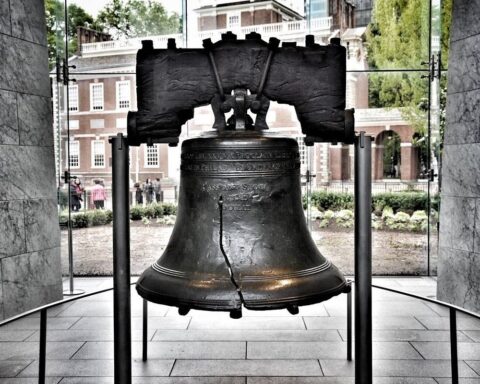
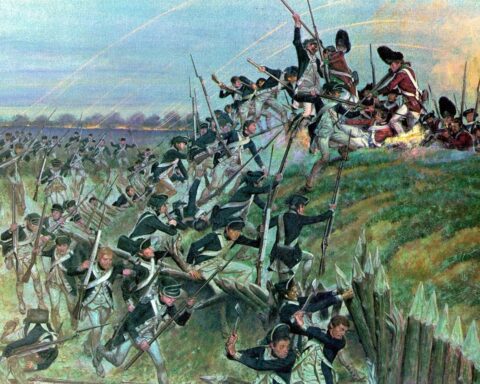
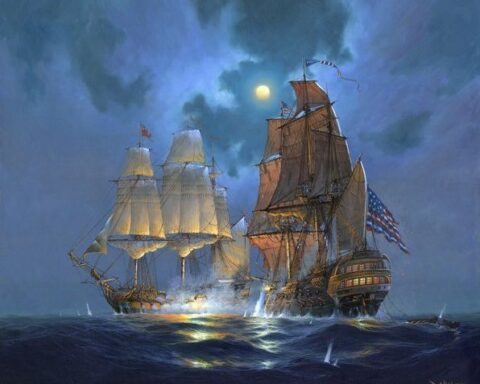
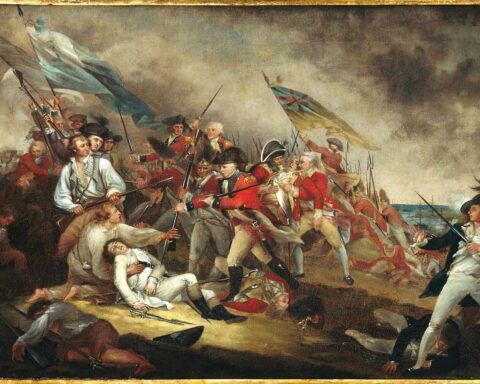
TRACING MY GREAT GRANDFATHER’S PRECURSORS IN MAKING A LIFE FROM RUSSIA TO BULWAYO